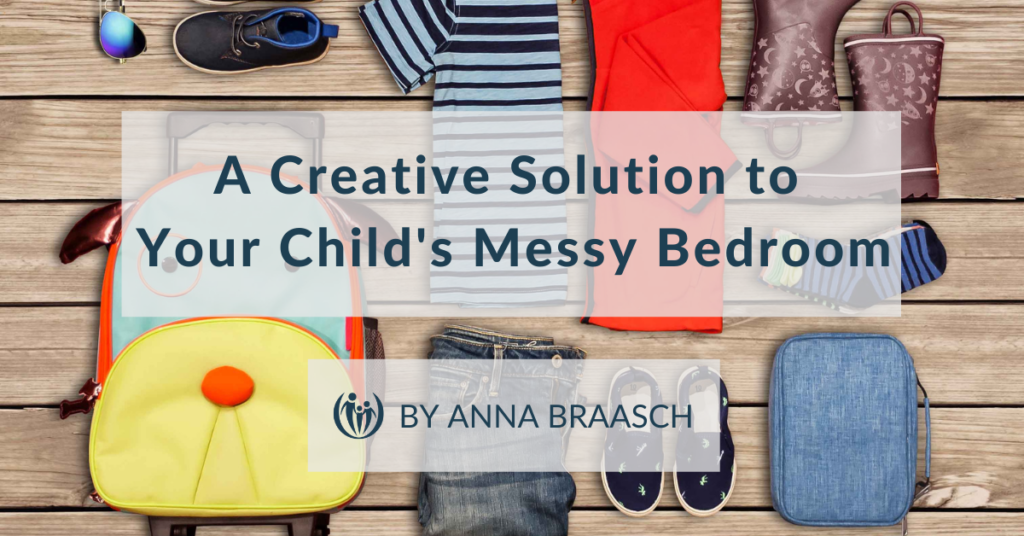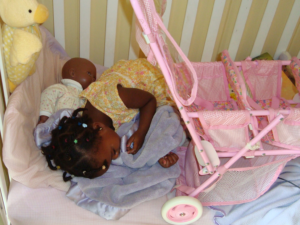
A Creative Solution to Your Child’s Messy Bedroom

Are you tired of navigating the Lego landmines and toy mazes in your child’s messy bedroom, but you’re unsure of what to do? How much to intervene? Whether or not to just let it be their turf? How to eliminate the power struggle when it does need to be cleaned? The best answers to these questions can be quite different from family to family, but we love to provide parents with creative ideas to consider!
My 10-year-old daughter loooooooves her stuff: plush toys have feelings, knick knacks evoke memories, craft materials hold promise and possibility! This is a picture of our daughter at two years old with her “stuff” surrounding her while she slept.

I, however, lean the other direction; every item has a purpose and a place. When no longer needed, it is, with gratitude, released into the world to be enjoyed and used by someone else. The less stuff I own, the easier it is to keep my house clean!
Why I never touched my kids’ messy bedrooms
I loved organizing so much that I had my own business as a professional organizer! When I shifted to working at Connected Families full time, I no longer had the ability to work with clients in their homes. However, I spent many Saturdays listening to audiobooks and continuing to declutter and organize my home.
But not my kids’ rooms!
And here’s why:
- I know that people sometimes swing the other direction from their parents, especially if they feel a value was forced on them. For example, if parents are uber frugal, kids might swing to overspending as adults. I want to model balance so my kids can find their own path.
- I’ve worked with organizing clients whose struggle with neatness was compounded by their parents’ extreme, shaming reactions to their mess. I want to avoid shaming my kids in any way over this issue.
- Raising kids with messy rooms is part of my master plan to raise well-rounded and organized adults! When my two children were young, I had every last inch of their room organized, with daily and weekly “clean up!” plans. But as each year passed, I released a little more rope. I want this to be their journey – not mine!
- While the stakes are small I want them to experience the consequences of living in a messy environment. I want them to lose homework, not find the shirt they want to wear, and pay library fines for unreturned books. I want my kids to build their own value for neatness and organization, as they experience the impacts of living in a messy environment.
Being “hired” to organize my child’s messy bedroom
For a couple of years I’d casually offer my professional services to both my children. The day that my daughter asked if she could “hire me” to help declutter and organize her room, I calmly and cooley said, “Sure!” while inside I was dancing a jig!
I scheduled a new client consultation with my daughter a few days before our three-hour organizing session. I did this to set a warm tone with clients, and then give them some space to mentally and emotionally prepare for the work day. After knocking on her bedroom door and introducing myself, I got right down to business and conducted a new client interview.
Some of the questions I asked her:
- Close your eyes and imagine your room when we are finished. What words would you use to describe this space? (Comfortable, cozy, things in places where I can find them easily.)
- What is most frustrating about your room right now? (The top part of the closet, my bookshelf, and my desk always has too much stuff on it.)
- Do you feel like you have too much, too little, or the right amount of items in your room? (Definitely too much.)
- When you clean your room, how long does it stay clean? (About two days. The longest it has stayed clean is 2 weeks.)
- In what ways does your lack of organization in your room impact your life? (I can’t find what I need. It takes a long time to clean my room. It’s hard to have friends over.)
I’m pretty sure I’d never had a client I was more excited (or nervous!) to serve than my daughter. There was plenty of history there. Like the time, when she was five, and I was trying to declutter and organize her room. She yelled at me, “Go work with someone your own size!” So this new arrangement was a BIG step for us, and I didn’t want to ruin it!
When the work day finally arrived, we blasted through her room and accomplished a lot in an incredibly short period of time. And, most importantly, there wasn’t the normal emotional angst or drama we’ve experienced in the past!
The four Discipline That Connects With Your Child’s Heart messages guided my approach:
- I communicated, “You are safe with me” as I treated my daughter like a respected client.
- I spoke calmly without assumptions or judgments.
- Our scheduled time reflected her needs, not my eagerness. We didn’t take on the whole room, and when our time was up, we scheduled another session to finish.
- I communicated, “You are capable of creating a room that reflects what’s important to you,” by asking lots of questions, instead of telling her what to do.
- I communicated, “You are loved even when you’re cranky,” but also “You are responsible to treat me respectfully.” When she occasionally slipped into treating me less respectfully (like an out-of-sorts child might respond to her parent) I’d smile and quip, “Sounds like you’re pretty tired. Should I go check with your mom about getting you a snack?” This play-acting kept things light, and reminded her to be respectful.
I waited about three months after our organizing sessions before asking my daughter what the biggest difference has been. “It’s so much better,” she replied. “I can find my stuff when I need to find it, and it’s easier to pick up and keep clean. It’s not so embarrassing when I have my friends over.”
Practical ideas to get you started (even if you aren’t a professional organizer):
- Let your child know whenever they are ready, you are available to help them with their room. By using lots of questions and encouragement, you can help them get it organized the way they would like it. You could even watch a home organizing show together to jump-start your process.
- As you ask questions from the “new client” consultation list above, really listen to your child and reflect back and validate what’s important to them.
- When helping your child evaluate whether to keep, or let go of an item, some helpful questions are: Do you love it? Do you use it? Would you buy it again?
- Does this still seem like an overwhelming task? If so, consider asking a friend or relative who would be a natural at playing the role of organizing consultant.
If parents try to take control of kids’ rooms with their own agenda, cleaning can be a frustrating power struggle with kids. When parents are equipped with some thoughtful questions and encouragement, it can be a great opportunity to enjoy working together while building values and skills children need.
Author’s note: This article about my child’s messy bedroom originally ran in 2017. My daughter is now 15 and loves spending a lazy Sunday afternoon decluttering, cleaning, and reorganizing her bedroom. I even give her extra spending money for tackling a drawer or closet in the kitchen, bathroom, or laundry room!
What are your parenting strengths?
You’ve got them. Knowing your strengths will help you become the best parent you can be. Knowing your parenting challenges is useful information too. Take our FREE ASSESSMENT.

